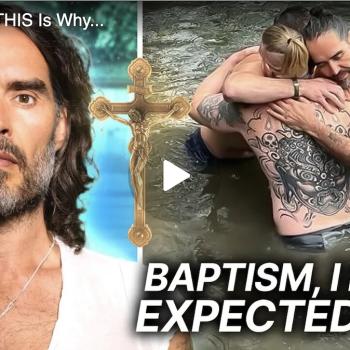 Many new Christians ask about water baptism, and are unclear as to its significance. What follows is an extract from my book Hope Reborn and is used by permission of the publisher.
Many new Christians ask about water baptism, and are unclear as to its significance. What follows is an extract from my book Hope Reborn and is used by permission of the publisher.
When Peter was asked “What must we do to be saved?” his reply outlined four steps to begin your Christian journey. The first, repentance is often also described as believing in Jesus, and is explained in another section of the book entitled, How to Become a Christian.
MAKE A PUBLIC DECLARATION OF YOUR NEW FAITH IN JESUS.
As we discussed in another article, making a public confession of your faith is very important. If you have never been baptized, the best way to openly declare your faith is to invite your friends and family to witness you following the command of both the Apostle Peter and the Lord Jesus Himself. Your baptism will be a vivid demonstration of the gospel to those closest to you, as well as a crucial moment in your walk with God.
Baptism is a way of publicly demonstrating the reality of what God has done for you in your heart. It doesn’t make you a Christian any more than jogging makes you human. But just as running is a sign that you are alive, baptism is a good sign you have made Jesus your Lord.
The word “baptism” literally means to be immersed or dunked. Bible verses talk of “much water” being required (John 3:23), and of going “down into” and “up out of” the water (Acts 8:36-39). We believe these verses demonstrate that baptism in New Testament times meant to get soaked, like in a bath, in the same way that Jesus was baptized by being immersed in the river Jordan.
We believe that the biblical pattern for baptism is to submerge in water people who have chosen to follow Jesus for themselves. However, there are many genuine Christians who have a different view of this, so some churches will instead sprinkle water on the head, as in the case of an infant. They do this because they feel that verses like Genesis 17:7 and Acts 2:38-39 show that God blesses families as a whole unit, and so the children of believers are part of God’s covenant community.
It seems to us, however, that in the book of Acts baptism follows the faith of the individual being baptized. So, for example, when the Philippian jailer and his whole family were baptized, this was after they had all listened to the gospel message, and believed it, and their newfound faith led to them all being full of joy (Acts 16:30-34).
Christians may differ on the when and the how, but one thing that we can all agree on is that Christians should be baptized, and that making a public profession of your faith in Jesus is a critically important step in your life as a believer in Christ.
Jesus gave very clear instructions to His followers after His resurrection:
Go therefore and make disciples of all nations, baptizing them in the name of the Father and of the Son and of the Holy Spirit, teaching them to observe all that I have commanded you. (Matthew 28:19-20)
It would be very strange to claim that you want to follow Jesus as your Lord, but then refuse to obey the first command He gives you after you have repented.
Jesus Himself was baptized (Luke 3:21-22), despite the fact that He had never sinned. Sometimes people feel that they have become a Christian too recently to be baptized, or that they have followed Jesus for so long it now seems pointless and too late. But there is no better time than right now to follow Jesus’ example.
Baptism is all about turning from your old life and beginning a new one. It is a way of demonstrating that you are now seeking to follow Jesus. It is “for the forgiveness of your sins” (Acts 2:38), and represents a bath to wash away our sins:
Baptism … now saves you, not as a removal of dirt from the body but as an appeal to God for a good conscience, through the resurrection of Jesus Christ. (1 Peter 3:21)
Through baptism we identify with both the death and resurrection of Jesus. It is like our own death, burial, and funeral service. We die to our old way of life by sharing in Jesus’ death. Baptism by immersion demonstrates this visually. As a person goes down under the water, it is as if they have been buried:
All of us who have been baptized into Christ Jesus were baptized into his death. (Romans 6:3)
As a person comes up out of the water, this represents the way that Jesus has raised them up to a new life, a new beginning:
Having been buried with him in baptism, in which you were also raised with him through faith in the powerful working of God, who raised him from the dead. (Colossians 2:12)
Therefore, if anyone is in Christ, he is a new creation. The old has passed away; behold, the new has come. (2 Corinthians 5:17)
Baptism represents our certain hope that while we will still experience physical death (unless Jesus returns first), God will not leave us in the grave. Instead, Jesus will raise us up to live with Him forever. We will have renewed bodies and we will finally meet our Savior face-to-face (1 Corinthians 13:12).
There is a supernatural element to baptism. It is more than an outward ritual. It is truly a fresh start, and represents a clear cutting off and freedom from unhelpful ties to the past. Christians will often experience an inner feeling of being made “new.” Just as God said to Jesus, “This is my beloved Son,” when He was baptized, many Christians report feeling the love of God in a tangible way at the moment of their baptism.
When you are baptized, your local church is also declaring before God and witnesses that they believe you are now a Christian. Don’t be surprised if the church you attend wants to get to know you a little first, or if they ask you to attend a preparation course. It can sometimes be a little frustrating to wait once you have made up your mind, but Jesus sees your heart and the desire you have to obey Him in this way.
The Apostle Peter promises those who repent and are baptized, “you will receive the gift of the Holy Spirit” (Acts 2:38). This is explained in another article: How to receive the Holy Spirit.

















